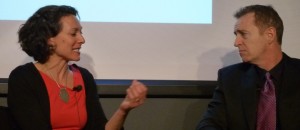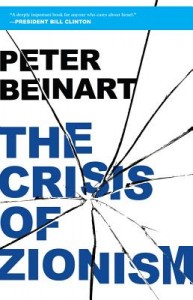Emily Bazelon & Dave Cullen Talk Bullying, Meanness & Peer Pressure
 Emily Bazelon’s new book Sticks and Stones: Defeating the Culture of Bullying and Rediscovering the Power of Character and Empathy has been a lightning rod for criticism among educators and parents who believe the author shows too much understanding for all parties in the social equation, the bullies and the bullied, even while it has won much praise among readers who praise its comprehensive and nuanced examination of these very complex issues. Last night at one of the New America Foundation’s excellent programs, Bazelon was interviewed by journalist Dave Cullen, author of Columbine, published in 2009. The two conducted quite a probing conversation, in which the tension of the reception over Bazelon’s book was played out for an audience of about forty people.
Emily Bazelon’s new book Sticks and Stones: Defeating the Culture of Bullying and Rediscovering the Power of Character and Empathy has been a lightning rod for criticism among educators and parents who believe the author shows too much understanding for all parties in the social equation, the bullies and the bullied, even while it has won much praise among readers who praise its comprehensive and nuanced examination of these very complex issues. Last night at one of the New America Foundation’s excellent programs, Bazelon was interviewed by journalist Dave Cullen, author of Columbine, published in 2009. The two conducted quite a probing conversation, in which the tension of the reception over Bazelon’s book was played out for an audience of about forty people.
Cullen was an occasionally rambling but very animated moderator. His odd style fueled the conversation, lending it an unpredictable air and keeping everyone a bit off balance. He disclosed that as a teenager, one who only would later realize he was gay, he’d endured a lot of ridicule and meanness. One time the conflict escalated in to a fistfight with an antagonist. Cullen added that after this the two of them got along better. While Bazelon did not of course endorse fighting, she did remind the audience that aggression is an unavoidable part of adolescence, and we ought not be so delusional as to believe it can be programmed out of teenage behavior. The Q&A with the audience continued in the same provocative vein.
Right off the bat, an African-American woman asserted that much bullying has a racist impulse–a useful point to hear since it seems nowadays much of the bullying reported in mass media lately is over gender and sexual identity issues; a gentleman asked about bullying in the workplace, citing a recent instance where as a manager he’d had to handle a complaint by one female employee about another who had been critical of her performance. He didn’t think there’d been bullying, or anything improper, but he couldn’t be sure. A third audience member told Cullen how much he’d appreciated his sensitive interview with Rachel Maddow on the night of the Newtown shootings, and then asked him to weigh on the gun safety debate. Cullen made a remark I tweeted about. He rapped the pro-gun crowd’s axiom, “Guns don’t kill people, people kill people,” with an alternate spin: “Guns and people kill people.”
When I was called on, I used my moment to say that as a young person the only fights I ever got in occurred when I was defending someone being picked on. I remarked that by definition, most bullying incidents occur when adults are not around, then asked whether adult mediation efforts in schools can be helpful. Bazelon responded by citing statistics that show kids intervene when someone’s being picked on only 20% of the time, though that helps reduce the bullying in more than half the cases. Still, people are hesitant, lest they be the next one targeted. She told a story about a recent incident in the NYC subway, when she defended an older man who was being hassled by a group of kids. As she put it, she thought, “I’m writing a book about bullying, I have to do something about this.” Turned out the kids left the man and turned on her with scary intensity, calling her names and following her out of the subway system at her stop. She said that too often an attempted mediation–one with an implicit “Can’t we all just get along” subtext–will put the bully and the victim on the same level of responsibility, which takes the former off the hook for his abusive conduct, and makes the latter feel worse than before the intervention. Another member of the audience asked about resiliency among young people, a topic that Bazelon eagerly grasped, saying that it is really the theme of much of her work–our capacity to endure mistreatment, slough off hurt and rise to a new level of maturity. She published a NY Times Op-Ed in March headed, Defining Bullying Down, which advances many of the ideas in her book.
Through it all, Bazelon insisted on a key distinction that not all mean behavior is bullying–defined as harassment of a victim conducted in view of others, persisting over a length of time, often involving physical abuse. She didn’t diminish the merely mean, but said not all bad conduct is on the same level. It is this part of her thesis that has drawn fire from critics who believe, I guess, that she doesn’t sufficiently condemn all bad actors. Bazelon and Cullen agreed that mass media often sensationalizes reporting on this topic, often escalating situations beyond where they were before the coverage. Cullen added that in doing the reporting for Columbine, he discovered many myths about the incident, stories that had become sturdy urban legends–he learned that the Columbine killers hadn’t really been bullied, and were never members of the so-called ‘trenchcoat mafia” in their high school. Bazelon said that both she and Cullen have been called “bullying denialists,” and is resigned to be judged that way. She published a NY Times Op-Ed in March headed, Defining Bullying Down, which advances many of these nuances.
I tweeted throughout the discussion and you can go back and follow the timeline at this link, under the hashtag #NANYC. Even after an hour covering this topic, most of the audience felt there was much more to discuss, and many people stayed around to talk further. While Bazelon signed books, I mingled and met several fellow members of the audience. I had been seated near journalist Jon Ronson, whom I recognized from social networks we both occupy. He’s the author of several books I’ve enjoyed and have written about it here—The Men Who Stare at Goats; The Psychopath Test: A Journey Through the Madness Industry; and Them: Adventures With Extremists. We talked about a new film he’s written on, a feature called “Frank.” He’d come with his teenage son whom I also met, the only young person I noticed in the group.
I also met and spoke with Harsha Murthy, a congenial man who works in the pharmaceutical industry. He was there with three attorney friends. Two of them, Jennifer Freeman and Robert Lewis, have their own firm, Freeman Lewis, whose Twitter page explains they “represent victims of child trafficking, child sex abuse, online child sexual exploitation, and child pornography.” Harsha introduced me to Jennifer and Robert, and a third attorney, James Marsh, who coincidentally knew the work of an author of mine, Montreal reporter Julian Sher, whose book Caught in the Web: Inside the Police Hunt to Rescue Children from Online Predators I published in 2007. They had all come this night because in January Emily Bazelon profiled pathbreaking legal work in a lengthy cover story for the New York Times Magazine, The Price of a Stolen Childhood. Bazelon’s story focused on novel legal strategies undertaken by James Marsh seeking financial restitution for victims of child pornography. At the time of Bazelon’s article early this year, the Times did a blog interview with her. At the end, Times reporter Rachel Nolan asked a question that elicited a fulsome reply which I will allow to close this report.
“You’ve done past reporting on bullying and have just finished a book on the topic. Is there some connection between this piece [on child pornography] and that work?”
“Working on this article alongside the book made me think about all the different ways of being a victim, and how you can both reckon with that identity and not let it overwhelm you. Some targets of bullying recover, and others don’t. One of the things I have been most interested in all of my work is human resilience. Recovering from trauma is not easy, nor does it come naturally, nor does it always happen. It’s unimaginable what Amy and Nicole went through, truly. I do want readers to feel what it is like to be these women, even if just for a moment. But I also wanted to show the benefit of the legal process for Amy and Nicole and that it has helped foster their resilience.”


